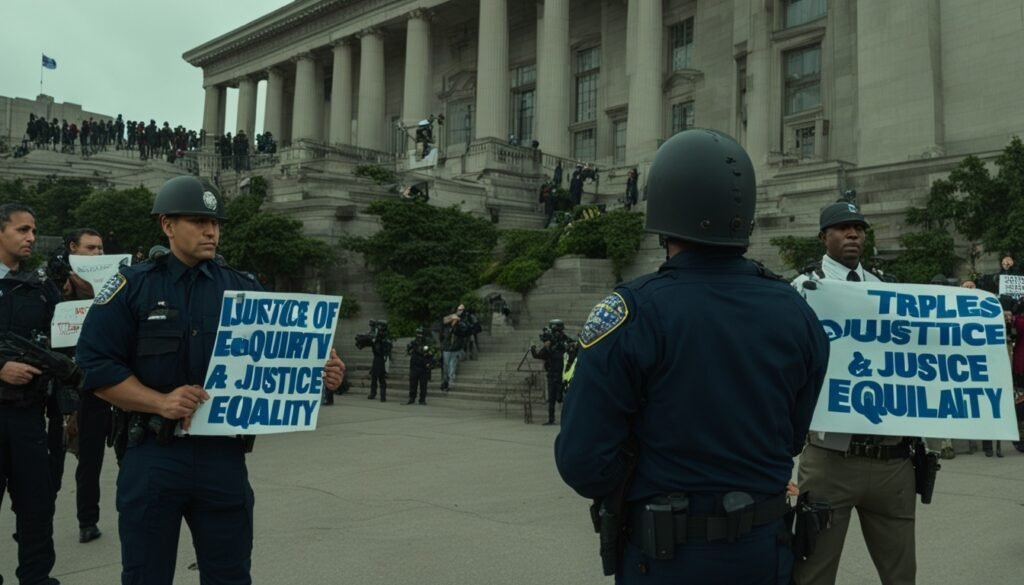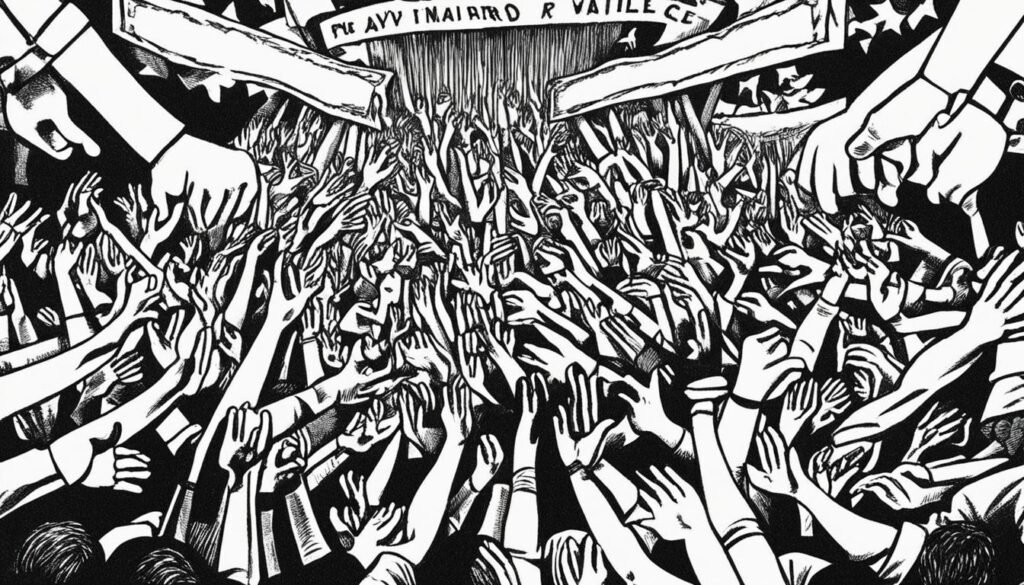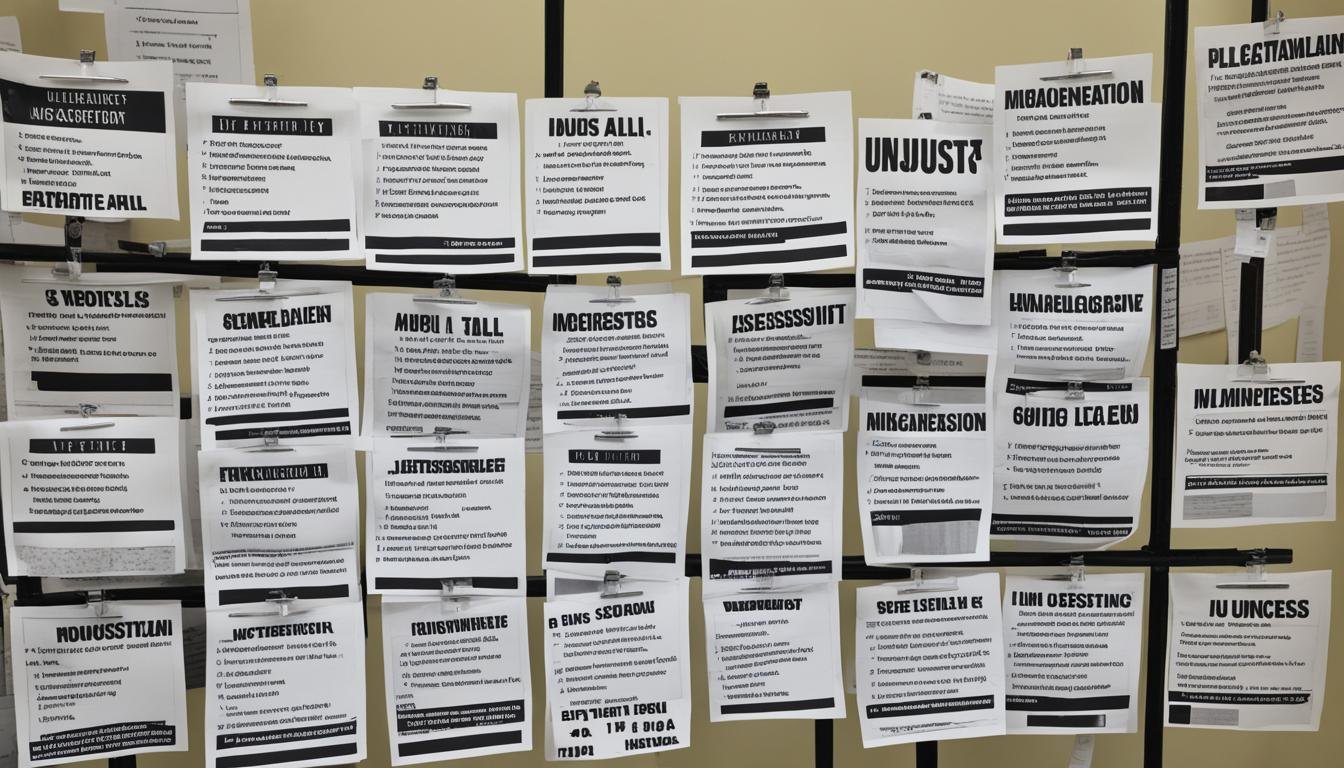In 1954, a historic Supreme Court ruling ended school segregation. This marked a big step in civil rights. The decision showed how harmful segregation laws were. It led to deep issues and hurt for minorities like African Americans. Many were not even allowed to vote in some places, such as Alabama.
Civil rights leader Martin Luther King Jr. was once arrested for protesting without permission. This showed how bad laws could be used to keep discrimination alive. The event highlighted the power of peaceful protest. It showed that sometimes breaking an unjust law is a way to challenge it.
Key Takeaways
- Unjust laws have targeted vulnerable populations throughout history, denying their fundamental rights and freedoms.
- Racial segregation laws, discriminatory voting restrictions, and laws criminalizing same-sex marriage are examples of unjust legislation.
- Overcoming unjust laws has often required courageous acts of civil disobedience, as individuals and communities challenge the status quo.
- The Supreme Court’s landmark 1954 decision outlawing segregation in public schools was a significant legal milestone in the civil rights movement.
- Unjust laws can have devastating impacts, trapping individuals in cycles of poverty and denying them access to basic resources and opportunities.
The Struggle for Justice: Civil Disobedience Throughout History
Civil disobedience means saying no to unfair rules without fighting. It’s a key way to make society better over time. John Rawls, a wise thinker, called it a “public effort that is peaceful, ethical, and political, violating law to spark government policy changes.”
Historical Examples of Civil Disobedience
In many places, people have used civil disobedience to fight for rights. For instance, UK women battled for voting rights. Gandhi in India sparked change with his Salt March. In America, the Montgomery boycott shattered segregation. Down under, the Wave Hill Walk Off fought for native rights. The “Sip-in” event in 1960s New York fought for LGBTQ+ basic rights.
| Event | Location | Impact |
|---|---|---|
| Women’s Suffrage Movement | United Kingdom | Women in the UK gained equal voting rights after a long fight. |
| Salt March | India | In 1930, Gandhi led a march against unfair British salt laws helping India win freedom by 1947. |
| Montgomery Bus Boycott | Montgomery, Alabama, USA | African Americans boycotted buses for over a year, ending segregation with a court decision. |
| Wave Hill Walk Off | Australia | Australian natives’ protest led to the return of much of their land in 1975. |
| The Sip-In | New York, USA | Four gay individuals protested at a bar, triggering changes in state laws against discrimination. |
These protests have played a big role in fixing unfair laws and making societies fairer around the globe.

“Civil disobedience is not our problem. Our problem is civil obedience. Our problem is the fact that people all over the world have obeyed the dictates of leaders…and millions have been killed because of this obedience… Our job is to make the moral code of the universe.”
– Howard Zinn, American historian and social activist
Unjust Laws: Historical and Modern Injustices
Unjust laws are still a big issue today. They cause unfairness and discrimination. For instance, the money bail system means rich people can pay to leave jail. But the poor often stay locked up. This can lead to job loss, losing their homes, and not being able to support their families.
Similarly, private bail companies take advantage of the poor. They offer debts that are hard to pay off. Then, there are suspended driver’s licenses. They make it tough for people to work and get what they need, keeping them poor.
Mandatory minimum sentences hit hard on those in minority and low-income groups. This leads to many people going to jail, even if they did minor crimes. Then there are the Wealth-based banishment laws, private probation abuses, and making poor people go to “debtors’ prisons”. These also keep the cycle of inequality going.
Sex offense registration laws are harsh too. They can force people into homelessness and job loss. This makes it hard for them to live a good life. These laws go against human rights and make fairness and equality hard to achieve.
“Injustice anywhere is a threat to justice everywhere. We are caught in an inescapable network of mutuality, tied in a single garment of destiny. Whatever affects one directly, affects all indirectly.”
– Martin Luther King Jr.
People and groups have always fought bad laws. They’ve used civil disobedience to make change. From the civil rights movement to ending apartheid, these efforts are key to making society more fair.

The battle against unfair laws goes on today. Grassroots groups and advocates work hard against these laws. They spread the word, bring people together, and push for new laws. Their goal is a world where everyone can do well, no matter their background.
Conclusion
The fight against unfair laws shows us how powerful civil disobedience is. People have always stood up against laws that treat others unfairly. From fighting for women’s right to vote to the civil rights movements in the 20th century, protest has driven change.
We still have unfair laws today. But history teaches us that change is possible when we work together. By standing up against these laws, we can make the future better for everyone. This fight for fairness is crucial for a true democratic society.
People like Martin Luther King Jr. and those who fought for LGBTQ+ rights inspire us to continue. Through peaceful protest and legal action, we can make a difference. Our goal is to live in a world where everyone’s rights and dignity are protected.
FAQ
What are some examples of unjust laws throughout history?
How has civil disobedience played a role in challenging unjust laws?
What are some examples of unjust laws in modern society?
Source Links
- https://www.jfklibrary.org/sites/default/files/2020-04/Birmingham Letter Excerpts for Activity.pdf
- https://www.jfklibrary.org/sites/default/files/2021-03/MLK on Just and Unjust Laws Activity 2021.pdf
- https://www.aclu.org/court-cases?type=supreme-court
- https://www.liberties.eu/en/stories/civil-disobedience/44569
- https://rebellion.global/blog/2020/11/03/civil-disobedience-examples/
- https://www.jfklibrary.org/learn/education/teachers/curricular-resources/what-if-laws-are-unjust
- https://equaljusticeunderlaw.org/8-ways-our-legal-system-punishes-people-who-are-poor
- https://www.one.org/us/stories/8-people-who-broke-the-law-to-change-the-world/
- https://www.history.com/news/civil-rights-legislation
- https://www.linkedin.com/pulse/critical-analysis-just-law-mario-salazar
- https://www.bartleby.com/essay/Just-And-Unjust-Law-PJQ6KF6BG

